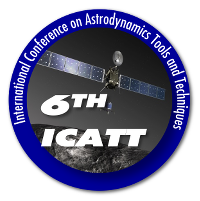Speaker
Mr
Ivan Sumelzo Martinez
(Centre National d’Etudes Spatiales, French Space Agency)
Description
JOSCAR/JDRAGON are both new tools of maneuvers strategies computation, developed internally in CNES (Centre National d’Etudes Spatiales, French Space Agency) at the Orbital Maneuvers Office (DCT/SB/MO).
Thus, thanks to the decision, some years ago, to use Java technology, existing Fortran tools and libraries are going to be rewritten specially in order to use the powerful CNES PATRIUS library.
In that frame, JOSCAR/JDRAGON tools have been rewritten in Java even if they are always based on the same basic principles of the initial OSCAR/DRAGON Fortran versions which were intensively used for the Automated Transfer Vehicle (ATV) and still today, for the operational design of the LEOP, phasing and rendezvous scenarios for GALILEO missions. This paper will describe the methods implemented as well as the software functionalities, pointing out the differences between JAVA versus FORTRAN version, the first one taking advantage of some PATRIUS new functionalities as well as almost 20 years usage feedback.
Thus, JDRAGON is able of computing a near-optimal mission plan, using initial conditions for target and chaser spacecraft’s, an amount of maneuvers to be optimized respecting some constraints of application and rendezvous conditions. It is based on a robust and fast method, which requires calling a numerical propagator iteratively. For this purpose, JPSIMU has been also developed based on its PSIMU predecessor which is the heart of numerous CNES flight dynamics tools (as in ATV-CC or GALILEO FDS ones). At a higher level, JOSCAR, which uses JDRAGON as a kernel, allows to perform End-to-End Monte-Carlo simulations, necessary to test robustness of the computed strategies for mission analysis purpose.
Above the new design of these tools, thanks to the Java object approach, their validation is also a big challenge. Thematic validations have been performed with not easy comparisons with the Fortran version, given the differences in their corresponding flight dynamics libraries. Special efforts have been put into performance, looking for optimal tools settings, aiming at having both fast computations and satisfactory accurate results. Concerning the quality of the code, Eclipse environment analysis tools have been used in order to be compliant with CNES coding standard rules.
At last, in order to deal with the considerable input/output data generated, a Graphical User Interface has been also developed using GENIUS (a higher level CNES JAVA toolkit based on Swing) which allows using these tools in a more friendly way on many different Operating systems from Windows to Linux.
| Applicant type | First author |
|---|
Primary author
Mr
Ivan Sumelzo Martinez
(Centre National d’Etudes Spatiales, French Space Agency)
Co-author
Mr
Pierre Labourdette
(Centre National d'Etudes Spatiales, French Space Agency)

